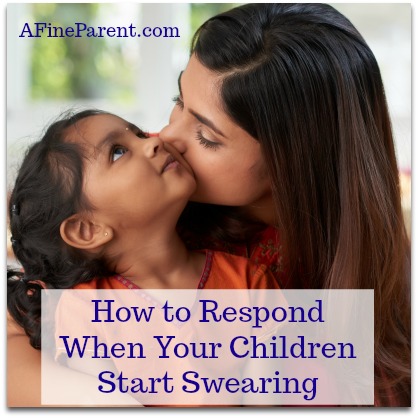 There is nothing like hearing your child yell the dreaded F-word for the first time.
There is nothing like hearing your child yell the dreaded F-word for the first time.
It’s especially nerve-racking when it’s in front of the entire extended family. Including the grandparents.
At a family dinner, my eleven-year-old nephew was deliberately jostled by his younger brother, resulting in his half laden plate tilting. With hot curry spilling over his hand, he yelled the F-word as loudly as he could.
Amidst the cacophony of family banter and the clattering of cutlery, you would have thought the word would have gone unnoticed but nope! There was complete silence around the dining table as if someone had pushed the pause button. Several pairs of eyes (including mine) zeroed in on the culprit.
Like a well-rehearsed play, the scene played out.
The youngsters looked down and snickered. Some of the adults (including me) tried to ignore what we had just heard. But not the grandparents!
Their old eyes looked around accusingly and the child’s parents both looked uncomfortable. The message from the grandparents was clear: If your child knew how to swear, it meant you had not brought him up with proper values.
“I’m sorry,” said my nephew not sounding the least bit sorry as he munched on crispy fried chicken. Everyone continued to eat. Someone mumbled something about children learning bad words from Netflix.
It’s true, I thought much later. Children do learn bad words from TV. And from a myriad of other places. They also learn them from us – their first role models.
Most of us use swear words when the going gets tough. It’s difficult not to. Depending on our nationalities, languages, and cultures, we all have a wide variety of swear words to choose from. Some of them even have a poetic ring to it – when you don’t know the meaning of course.
If you listen closely over a period of time, you’ll discover there’s a swear word for almost every alphabet in the English language, with some alphabets standing tall in the oft-used category.
Many times, I have entered a room full of youngsters consisting of my own children, their cousins, and friends and heard them talking to each other with swear words constantly popping into their sentences. These words are said casually and considered normal by said youngsters.
How do Children Learn Swear Words?
 From peers in school? On the street? From TV shows? In their own homes?
From peers in school? On the street? From TV shows? In their own homes?
Timothy Jay, a professor of psychology at Massachusetts College of Liberal Arts and Kristin Janschewitz, an assistant professor at Marist College have compiled data from detailed research into their article, “The Science of Swearing.”
Their data confirms that swearing in children emerges by age two and becomes adult-like by ages 11 or 12. By the time children enter school, they have a working vocabulary of 30-40 offensive words. (Gosh that’s a lot!)
“We do not know exactly how children learn swear words,” they say, “although this learning is an inevitable part of language learning, and it begins early in life. Through interview data, we know that young adults report having learned these words from parents, peers, and siblings, not from mass media.”
Most parents, however, refuse to give a pass to mass media. In the United States, the Federal Communications Commission (FCC) is the watchdog for regulating communications on television.
However, not everything relayed on TV comes under the jurisdiction of FCC. Cable shows like HBO are peppered with language so colorful it puts a rainbow to shame. Then there’s Netflix and YouTube, where children and teenagers can step into a world that is unrestricted, limitless and uncensored.
Picking up swear words in this network of possibilities is not only as easy as pie but is also the least worrisome among the other dangers lurking there.
At What Age do Children Pick up Swear Words?
Psychologists and Child Educators affirm that children are learning to swear at an earlier age today than they were doing in previous generations. They attribute this to the rise of profanity among adults since the 1980’s.
When swearing takes place below the age of three there’s not much to worry about. But if a school-aged child starts to swear, it could be to express negative feelings or to gain attention from a parent or teacher.
A teenager swears to give vent to anger or to fit in with his peers and appear ‘cool’ to them. Swearing can also be termed acceptable by teenagers when they hear it is frequently used by their favorite singers and actors in popular music and TV shows.
While singing ‘Who the f*#k is Alice’ bolstered teen egos in the 1970’s, the present generation is spoiled for choice. From Bruno Mars to Ariana Grande, almost every song at the top of the charts is peppered with explicit words.
Are Parents Concerned About Profanity in Children?
 Yes, most adults agree that profanity, when used by children can never be excusable. It not only reflects poor family values but also makes the child vulnerable to societal disapproval which in turn reduces self-esteem and confidence in the child.
Yes, most adults agree that profanity, when used by children can never be excusable. It not only reflects poor family values but also makes the child vulnerable to societal disapproval which in turn reduces self-esteem and confidence in the child.
Every parent at some point or another hears their children using swear words. Some of us hope they grow out of it and sometimes they do. But the more common scenario is that children only get more innovative with their swearing unless they are corrected at a young age.
Benjamin Bergen, professor of cognitive science at UC San Diego and author of What the F: What Swearing Reveals About our Language, Our Brains, and Ourselves, writes in the Los Angeles Times – “I’ve come up with a compromise solution. When I happen to swear around my kid, I provide some coaching. I engage him in an honest dialogue about why some words are OK in some places, but not others. Even a 2-year-old can understand that the f-word can be muttered consequence-free at home but might lead to a negative reaction when screamed in the supermarket.”
True, we as parents, almost always correct our youngsters. Yet what we often get in return is – “Aww c’mon mom, don’t be so old-fashioned. Everyone uses these words” or “Seriously? You think that’s a bad word? That’s so lame” and the most common rejoinder “It doesn’t mean anything.”
So What Can a Parent Do?
Here are ten simple solutions. Some worked like magic. Some I gave up halfway. But frankly every child is different so they are all worth trying.
1. Stop making excuses for your child’s potty mouth.
Explaining away bad language with: “He’s not to blame, he heard it from Mr. Smith at the store,” or “She must have picked it up from that show on TV, it’s no big deal,” isn’t going to help.
It may not be a big deal now, but it sure can be a big deal if it remains unchecked.
2. Do not overreact and yell at your child.
 If you do, it will very soon turn into a power struggle especially if you’re dealing with a teenager.
If you do, it will very soon turn into a power struggle especially if you’re dealing with a teenager.
Instead, sit them down and explain that there are so many other words in the English language that you can replace the swear word with. If the swearing is casual and occurs once in a blue moon simply ignore it.
If you make a big hue and cry when your teen stubs his toe and says “Oh f…. that hurt,” you will hear it much more often, simply because you overreacted the first time.
3. Consider the age of the child and set boundaries accordingly.
If the child is young most probably he or she has no idea what the word means. If it’s an older child, they probably know exactly what the word means and use it either for its shock value or to express anger.
Wait until your teen is calmer then explain to him or her that you will not tolerate swearing from them and if it is repeated, then they will have to deal with the consequences (could be the withdrawing of a privilege or an extra chore to be done around the house.)
4. Recognize verbal abuse and separate it from mere swearing.
At times, the swearing includes verbal abuse or is racist or sexist in nature. Without raising your voice, sternly request your child to stop this behavior immediately.
Tell them this is not just a bad word they are using, but that they are guilty of abusing the person they are directing the word to. Draw a clear-cut line between swearing about something (This is a f…..d up movie) to swearing at someone (You are such a f….ker).
5. Praise your children.
Now that you are on high-alert about your child’s language start to notice when they make choices to change. When they stop swearing, tell them you appreciate the effort they have put into making their language polite and cultured. Praise – specific comments about how they handled the situation – will reinforce good behavior.
6. Tell them what those words mean.
Most of the swear words our children use have a sexual reference and are used for shock value and attention, where sex is alluded to in a derogatory way.
Make sure you talk to your children about sex at an appropriate age. The more you put it off, the more chances they have of being misinformed.
7. Was it casual?
Differentiate between casual swearing and swearing induced by anger. Understand the latter stems from deeper issues. Find the root cause of the anger and work at solving the problem that caused it.
The swearing will probably disappear along with the anger. Make your child understand that their anger need not be a catalyst for swearing. Give them an alternative – namely discussion about the issue.
8. Make your kids language a part of their character.
We as parents teach our children manners at a very young age. Say “Please,” “Thank You,” and “Sorry,” we tell them repeatedly and “Be gentle, kind, considerate, and compassionate.”
In my experience when we cultivate the habit of thinking good thoughts we also tend to speak good words. If we aren’t thinking the swear words, it is less likely they will pop out in an inopportune moment. (Like in front of the grandparents.)
If they are conditioned from a young age to retain what is good in their minds, then as they grow up, they will be more likely to sift the swear words and ignore them when they hear it from their peers.
9. Supervise or restrict what they watch on TV, laptops, tabs, and smartphones.
 This is perhaps one of the toughest things you may have to do. The older your child, the more challenging the ‘restricting’ becomes.
This is perhaps one of the toughest things you may have to do. The older your child, the more challenging the ‘restricting’ becomes.
It means learning to be tech-savvy yourself. If you have to periodically stalk your kids on social media, then do it without feeling guilty but know where to draw the line, taking care to see that you don’t encroach on their privacy.
You have the right to know what kind of influence social media and television has on your child’s character. Nothing comes above and before the safety of your child.
10. Stop swearing yourself.
If you’ve contributed to the cause, allow yourself to feel that tinge of guilt. This guilt will lead you to stop swearing in front of your children.
If swearing is a real problem for you, explain to your children that you’re a work in progress and you need their help to change.
Children respect this kind of honesty from a parent. It makes them realize their parents are not putting on a mask of perfection and they reciprocate by being more open and honest themselves.
Maybe together the two of you can help and support each other in changing your language.
2 Minute Action Plan for Fine Parents
Take two minutes today and think about your child and their swearing.
According to you, how do you think your children learned to swear? Are you responsible in any way?
What are the ways in which you can stop your children from swearing? Are they watching too much TV? Are they keeping good company in school? Have you met all their friends?
How about your own language? Do you occasionally let some salty talk sneak past your lips?
Plan how you will talk to your kids. Think about how you can stay calm and aim for an honest discussion, laying some firm rules. Be clear of the consequences you are going to impose.
Long-Term Action Plan for Fine Parents
Sit down with your kids and have an honest discussion about the swearing. This may take more than one discussion.
Tell them you would like to meet their friends. All of them. Invite them over for a game or a meal.
Give your children an alternate word or ask them for an alternate word to use for every swear word they are inclined to use. Make it sound like a game.
Lay down rules for whenever a swear word is used – If the swearing is non-abusive enforce one consequence, like removing a privilege. If it’s abusive, enforce the privilege rule. Then give them time to reflect on what they said and say you expect a sincere apology from them.
Monitor the usage of mass media in your home over a period of time.
Be alert about the company your children keep – peers, extended family, and adults outside the house.
Train yourself not to overreact. (Deep breathing does wonders!)
At the end of the month gauge your progress – is there improvement? Has the swearing lessened? If it has, don’t forget to praise your children. It means you’re not the only one who is making an effort here.
Lastly, don’t come to the conclusion that just because your kids have learned to swear, you have somehow failed to be a fine parent. Nope! Far from it. And the sooner you let those grandparents know, the better.
Hi Korinthia. Thanks for reading and commenting. Your perspective was refreshing. Indeed even if parents don’t use swear words in the house, children can easily pick them up elsewhere. Personally I find certain swear words pretty offensive so using them in the house is completely discouraged. If for some reason a word slips out of my child’s mouth, but is immediately followed by a sorry, then I let it go and avoid making an issue of it😉
Interesting piece, but it makes me realize I am probably way out of the mainstream on this topic, but with oddly better results.
My husband and I seldom if ever swear, although there are moments I’ll do it for effect. My kids have mostly become aware of swear words on YouTube. I’ve explained to them that the actual words have meanings that aren’t any different from regular words, they’ve just been assigned a forbidden status for some reason. Believing a different word for poop is somehow bad is kind of superstitious in my opinion, and I don’t tolerate superstition. The only truly bad words in my mind are things that dehumanize people, such as the n-word. I made sure they were aware of it, and to recognize why it is offensive.
So the rule in our house is the kids have always had permission to use whatever words they want, they just have to choose the appropriate context. I’m not bothered by swear words in casual use, so if they want to swear at home they can. I think that sucked all the fun out of them, and my kids never swear. (I take that back, once when my oldest was about six something broke unexpectedly and she said, “Damn It!” and I was actually impressed by the appropriate context.)
I also said they needed to be aware that choosing those words will bother some people, so they should avoid them around little kids and old people where there is more likely to be a backlash. They still have permission to use them, they just need to recognize the consequences. If for some reason swearing in front of grandma is necessary to achieve the effect they are looking for with their words, I’m okay with that. They’re just words.
In any case, my kids don’t swear, they don’t like it when others do it, and I never have to worry about it. (It’s up there on the list of things they have permission to do but won’t, like drawing on their walls or taking up drums.)